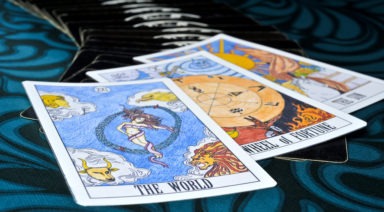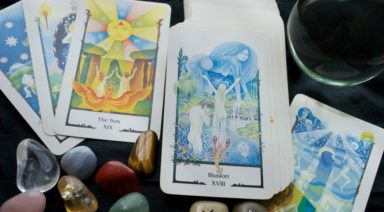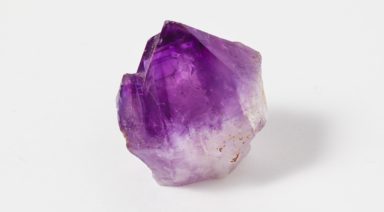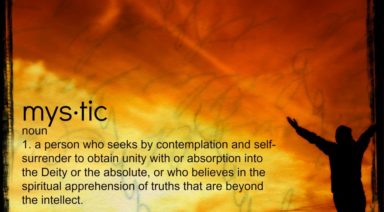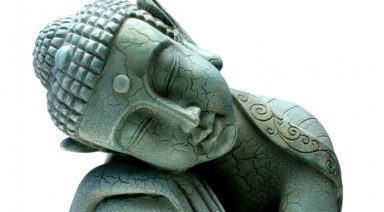The Seven Cycles of Life, and Then Some
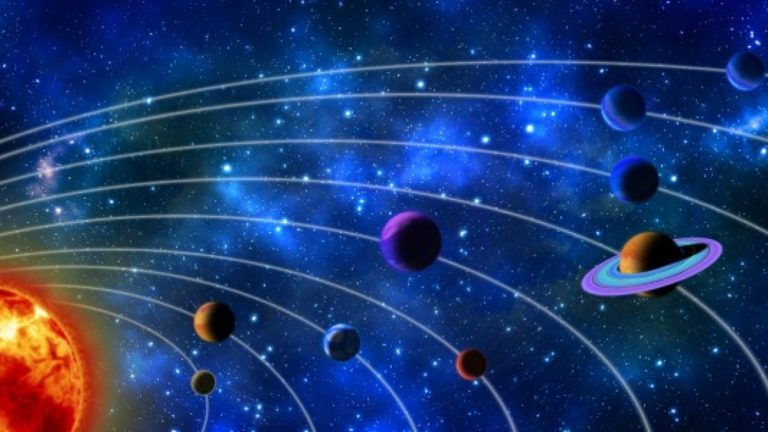
Did you know that no two people see the same rainbow? It’s a fact. Each of us views a rainbow through billions of water droplets. Even if we are only a couple of inches apart, we’re looking through a completely different set of lenses in order to see one of the most magnificent sights in nature. Hold that thought, as we’ll come back to it later.
The Number Seven
What is it about the number seven that fascinates us? With a pair of dice, seven is statistically the most probable number to be thrown. Fortunes have been made and lost on that premise. In many holy texts, the number seven is ubiquitous.
Seven is mentioned over 700 times in the Bible, starting off as the number of days it took to create the world and going from there. There are seven seals in the Book of Revelations. Seven trumpeters blew seven Shofars, ram’s horn trumpets, for seven days around Jericho, until the walls crumbled, and much more.
There are seven unique notes in our common musical scale, the eighth note being the octave above the first note. There are seven colors in a rainbow. The moon has four distinct phases: new moon, first quarter, full moon and third quarter, each of these approximately seven days apart.
There are seven Chakras. Last but certainly not least, and probably the most important reason that humans are fixated on the number seven, is that there are seven visible planets in the heavens. The most obvious of these are the Sun and Moon. The others are Venus, Mercury, Mars, Jupiter, and Saturn.
These seven planets have provided a foundation of belief that has been drawn upon for millennia. They became the Gods of the ancient Greeks, Romans, and Egyptians, as well as most other cultures. In Vedic astrology, they can define almost every aspect of our life, from birth to death and beyond.
The Ptolemaic System
In the second century of the common era, Claudius Ptolemy of Alexandria used the planets, based on their astrological and astronomical attributes, to define what he called, “The Seven Ages of Man.” Ptolemy was a genius and a student of astronomy, mathematics, music, cartography, humanity and the natural world. His theory of a Geocentric Universe defined celestial mechanics for centuries, mainly because it worked.
Ptolemy believed that everything that existed is connected to everything else and is ultimately linked to the planets. Each planet was given attributes, many of which are still used today by astrologers.
This led to the concept of each person being a unique microcosm of the cosmos, thus providing a model for explaining our journey through life, each planet ruling a designated number of years.
Ptolemy started our life cycle with the fastest of the planets, the Moon. Our lunar neighbor ruled birth to the age of 4. The Moon was thought of as pure and dynamic. It was equated to motherhood, children, and protection. The second phase belonged to Mercury, the second-fastest planet, and ruled until the age of fourteen.
From 14 to 22 years of age, Venus took control. I was once that age, and I can attest to the fact that my thoughts were often about Venus-ruled concerns, often way too much. The Sun took over for 19 years, until the age of 41. This was an individual’s time to shine and was followed by the period of Mars, which ruled until age 55. Jupiter took us to 67 and Saturn delivered us into our dotage.
Ptolemy’s stages of life are sensible and have been expanded upon by metaphysical and philosophical thinkers throughout the ages. Many such views are popular now, equating each stage with a certain animal, temperament, or some other sort of influence, but why not start with the original? Let’s take a look at Ptolemy’s system, but bring it forward a couple of thousand years.
Incidentally, I often say that the planets don’t punch time-clocks, so there will usually be an overlapping of planetary influences.
Stage 1: The Moon – 0 to Age 4
We come into life without knowledge of the world, a state of innocence.
As the Moon brings light to a dark night, this period provides our first views of life.
Sometimes the light is bright, and other times it’s dim, like moonlight during the Moon’s various phases. Today, children are exposed to a form of electronic illumination, unprecedented in history. I’ve met year-old infants who can work a smartphone better than I can. Hermeticism teaches that the Moon, as a reflection of the Sun, is a source of possible illusion. I hope the children of today will find a true light to guide them on the path of their future.
Stage 2: Mercury – Ages 4 to 14
Mercury traditionally rules the mind, intellectual pursuits, bargaining, and mischief. This ten year period includes going to school, making friends, puberty and becoming a social creature. It was during this stage that I discovered my obsession with metaphysics, or it discovered me, and I also became a certifiable Nerd, complete with a pocket protector and tape on the glasses. This period is one of the most important in our lives, as it often creates some of the powerful impressions that make us who we are for the rest of our days.
Mercury can deceive, so it’s important to remember that not all memories of the past are what they seem to be.
Stage 3: Venus – Age 14 to 22
I was a hormonal lunatic during my adolescent years, emotional, confused and desperate to find myself. Luckily, this stage segues into young adulthood and has more to it than angst.
Venus also deals with aesthetics, concepts of beauty, the development of certain ethics and one’s worldview.
In many ways, this is one of the most formative of all the stages, because it sets us up for whatever comes next in the world. This eight-year period aids us with our sense of reality and may imprint how we view our partners, as well as our friends, relatives and even ourselves throughout life. It’s vital that a positive self-image be nurtured during this period, as the results can linger for decades if we don’t actively seek changes.
Stage 4: The Sun – Ages 22 to 41
Our Solar stage allows us to exert our power and shine in the world as adults, whatever that may mean to the individual. We have all the rights and benefits of being full-grown, often without the experience and wisdom to know what to do with it. Some will use this period to gently warm their surroundings, nurturing, growing a lush garden for all to enjoy. Others will scorch the planet with intense heat and a lack of consciousness of other people.
It’s important to remember that for all of us, the Sun gives life, but it’s up to us to do something positive with that power.
If we don’t help others, we are lost. Personal spirituality and growth is often a part of this stage, but sometimes in an egocentric way.
Stage 5: Mars – Ages 41 to 55
Mars is action and is best exemplified by doing something positive in the world.
During this cycle, we should be as active as possible and fight for those things we believe in.
Unfortunately, along with this stage may come the realization that we have not found the life we thought we’d find and that things are not going precisely as expected. This is generally when a midlife crisis occurs.
Men and women find themselves wondering if that’s all there is, turning to physical pleasures, new cars, affairs or whatever else seemingly soothes the red-hot, Martian energy within them. Many divorces occur during this stage, mainly because the reasons for such dissatisfaction are rarely searched for internally, especially when it’s easier to project our woes onto the outside world.
Stage 6: Jupiter – Ages 55 to 67
With Jupiter comes the ability to sit back and look over one’s life objectively and hopefully without regrets.
Jupiter is a natural ruler and assumes a wisdom and understanding of the way things work.
In Vedic astrology, the planet Jupiter is often known as Guru, showing it to be a teacher and a giver of life and hope. It’s during the Jupiter stage that we can find the mastery of those pursuits we’ve been working on all our lives. Once mastery is attained, the realization of one’s mortality hopefully leads to the desire and imperative to teach. In the best of circumstances, Jupiter’s stage reveals a realization of the responsibility we have to those generations that will follow. It’s our duty to be benevolent, expansive and to pass along our knowledge to those who come after. This can be a highly spiritual time in our lives.
Stage 7: Saturn – Age 67 On
Saturn is the planet of chronological time. In Saturn, we realize the reality of our existence and true self-knowledge or the lack of it. Youth gives way to maturity, and eventually we move to a more joyful experience that can only be completely appreciated through the wisdom that comes from decades spent on this planet. For some, the Saturn stage creates an influential and enduring presence that should be embraced by society but has unfortunately been mostly neglected in the West.
For others, it’s a time of bitterness and regret. Within the memories of those in their Saturn stage is the living history of our planet. I knew a man who met Houdini and Al Capone, watched Jolson perform live and drank in speakeasies. Another man knew all the stars of old Hollywood and had pictures to prove it.
Past is prologue and the information Saturn has to pass on to us is priceless.
The ability to embrace our Saturn stage, without fear and with a sense of gratitude, is the reward of a life well-lived and well-loved.
These cycles are repeated in miniature forms every day in our lives. It’s possible to use the 7 stages for analyzing anything. For example, what stage is your job in right now? If you’re just starting out, are you in your Moon or Mercury phase? How about a relationship you’re in? Are you in a Mars phase? If so, can you be patient enough to move into your Jupiter phase, or are you anxious for Saturn to take over and begin again with the Moon in a new relationship?
A Timeless System
There is much that can be done with this system. You are limited only by your imagination and your willingness to embrace a concept thousands of years old, yet timeless. Ptolemy’s system works and makes sense.
Peer inside yourself to see the beauty of the celestial clockwork that we’re all part of. You’ll gain more than knowledge.
Remember that rainbow? Just as no two of us sees the exact same rainbow, none of us will experience a stage of life like anyone else. Therein lies one of the greatest benefits of this existence, that being the mystery itself. Don’t let anyone ever take that mystery away from you.
I wish you all peace and love.
Karmic Numbers: What Your Birthday Reveals About Past Lives
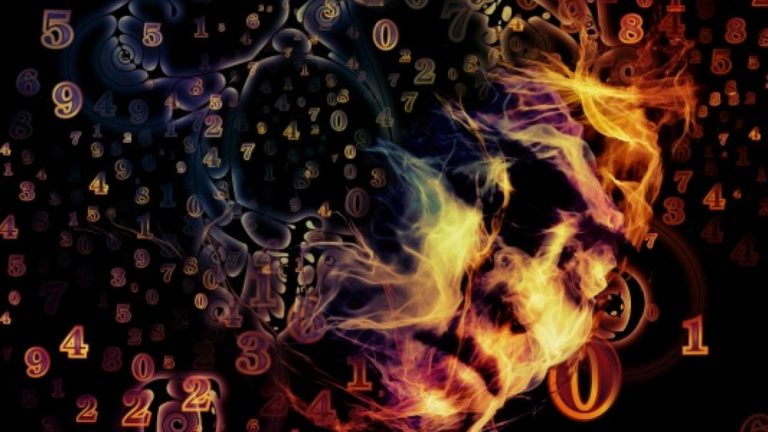
The day you were born says a lot about who you are and where you’re going in this life. In numerology, your birthday can also reveal insights into your past life by date of birth and the lessons you still carry forward. Pythagoras believed that every number carries energy, and the combined vibrations of the numbers in your life shape who you were, are, and will become.
The numbers in your birth date reveal hidden clues to lessons missed in past lives. In numerology, it is believed that our souls are core, but our bodies reincarnate many times in order to further evolve. With each life, new experiences bring growth, but mistakes and past actions also leave behind imbalances.
Along the way, we make mistakes and abuse our natural gifts. Using your birth date, we’re able to identify whether your numerology chart contains one of four important Karmic Numbers. The numbers 13, 14, 16, and 19 are Karmic Debt Numbers, which indicate areas of your past lives that may still need attention. Understanding these past mistakes allows you to balance and heal the karma in your present life.
How to Calculate Your Karma Numbers
There are four Karmic Debt Numbers: 13, 14, 16, and 19. Each one highlights a specific life lesson connected to past actions. To find your Karmic Number, look at three key areas in your numerology chart:
Past Life by Day of Birth
If you were born on the 13th, 14th, 16th, or 19th, then this is your karmic number. This suggests your birthday carries imbalances from previous lives that may still influence you today.
Being born on a karmic date suggests you entered this lifetime with specific challenges to work through. Each number carries a slightly different meaning:
- 13/4 – linked to discipline and responsibility, this number asks you to overcome procrastination or lack of focus.
- 14/5 – tied to freedom and balance, it challenges you to avoid overindulgence or misuse of personal power.
- 16/7 – connected to relationships and humility, this number teaches acceptance and warns against arrogance or over-dependence.
- 19/1 – about independence and personal strength, it highlights the need to overcome selfishness or misuse of authority.
Personality Number
Your personality number signifies the energy that you project to the outside world, as well as how others are most likely to interpret it. This is not your true self, but an indicator of what you allow to be seen at the beginning of a relationship. There are multiple ways to find your personality number; however, we choose to focus on adding your day of birth to your birth month. For example:
To calculate this number, add your day of birth to your birth month. For example:
- Birthday: May 5
- Calculation: 5+5=10=1+0=1
If your personality number is found by one of the following ways, then this is your Karmic Debt Number:
- 4 (13=1+3=4)
- 5 (14=1+4=5)
- 7 (16=1+6=7)
- 1 (19=1+9=10=1+0=1)
Life Path Number
Your life path number represents your true self and direction in life. It is one of the most important core numbers in numerology. To calculate it, add all the digits of your full birthday together until you reach a single digit or one of the master numbers (11, 22, 33).
Example: If your birthday is April 4, 1955, then:
- Day: 4
- Month: April is the fourth month = 4
- Year: 1955 = 1+9+5+5 = 20 = 2+0 = 2
Therefore:
- 4+4+2 = 10 = 1+0 = 1
The Life Path Number here is 1. If your Life Path reduces to a double-digit number that matches 13, 14, 16, or 19 before being broken down to a single-digit number, you have a karmic debt. For example, 16/7 shows the number 16 first, then reduces to 7.
Karmic debt numbers can also appear in other core numbers within a numerology chart, but the Day of Birth, Personality Number, and Life Path Number are the most common places to find them.




